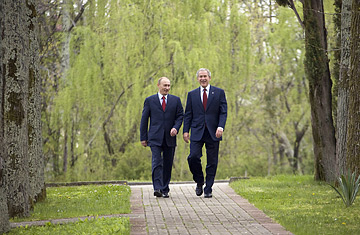
Putin (L) and Bush try to put an amicable face on tense ties in their last meeting as heads of state.
In a Russia where he has brought most things under his control, even the weather seemed to do President Vladimir Putin's bidding last Saturday when his U.S. counterpart flew in for a valedictory summit. The rain clouds that had threatened all week were nowhere to be seen, and the Black Sea, usually choppy at this time of year was preternaturally still, providing the perfect backdrop for the two leaders to be photographed walking off into the sunset.
The chemistry between Bush and Putin was warm and sentimental — clearly, the continuing coolness in the relationship between Washington and Moscow is nothing personal. "I want to repeat and confirm that working with the U.S. President has always been pleasant and interesting for me," said Putin, praising his American counterparts integrity and reliability. For his part, Bush did not spare words to heap up praise on the man whose soul he claimed to have glimpsed back in 2001, when they first met in the Slovenian capital of Ljubljana, and decided he could trust.
The Sochi meeting produced a rather amusing document, titled "The Strategic Framework Declaration," whose contents could be summed up in the old Russian adage that "It's better to be rich and healthy than poor and sick."
The declaration emphasized, for example, that the Cold War was over — although there was not much news in that observation, first made at an equivalent summit 18 years ago by President Bush's father and Soviet leader Mikhail Gorbachev. The document affirms their commitment to improve relations on all fronts, but the trend in U.S.-Russian relations may be moving the two countries further apart than closer together.
On the economic front, back in 2000 the U.S. invested $33 billion in Russia, which accounted for 22% of foreign direct investment in the country and made the U.S. Russia's top foreign investor. In the first nine months of the 2007, U.S. investment in Russia amounted to $8 billion, while direct investment amounted to $3.6 billion, pushing the U.S. third behind the U.K. and the Netherlands in Russia's list of foreign investors. Clearly U.S. corporations are more cautious about investing in Russia than they were eight years ago — which is hardly surprising given Moscow's willingness to trample over even giants like Royal Dutch Shell and British Petroleum in its efforts to restore control over major oil and gas fields.
On security, the "Framework" declaration calls for a "focus on the very real dangers that confront both our nations." But seven years after Bush and Putin first met, Russia and the U.S. don't agree on their prime security threats. Throughout his tenure, Putin has sounded the alarm on NATO's encircling of his country. Much as he has the grounds to decry the West's broken word, given back in the 1990s, NATO is engaged in Afghanistan against forces that would ultimately threaten Russia's southern flank. Putin even allows NATO to use Russian territory for logistics, and approved its use of air bases in Central Asian countries. Still, President Bush failed to convince his Russian counterpart and friend that the latter's stringent anti-NATO rhetoric is counterproductive.
And what of politics? Consumed with his global war on terrorism, Bush has tended to look the other way as Putin has curtailed whatever feeble political freedoms Russia enjoyed eight years ago. President Bush only laughed when an American correspondent asked who would now represent Russia at international forums and Putin answered that it would be his successor, Dmitri Medvedev, who once he becomes President, will, "under the Russian Constitution define foreign policies." Bush may have had reason to laugh: he knows as well as anyone who will hold the hand of the new Russian President once Medvedev is inaugurated next month.
By Sunday morning, President Bush was gone. Clouds and showers soon returned to Sochi, and the Black Sea returned to its seasonally typical tempestuous ways. The two Presidents parted as friends, but despite their enjoyment of each other's company, their countries remain further apart now than when they first locked eyes in Lubljana.
